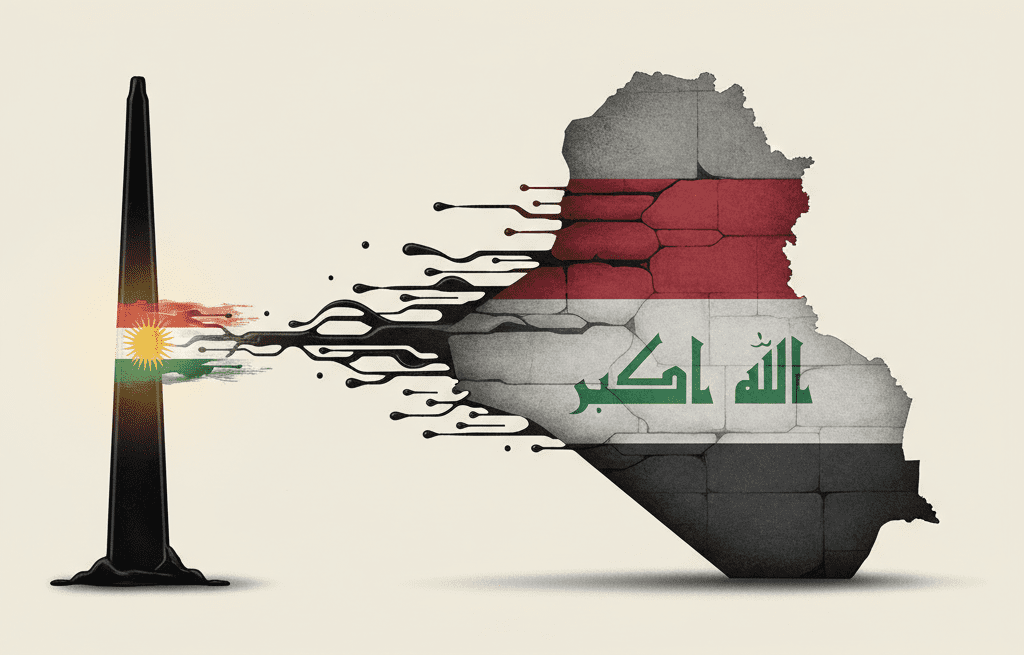Who Gets What From the KRG–Baghdad Oil Deal?

Eighteen years after Kurdistan passed its Oil and Gas Law and eight years after its ill-fated independence referendum, the economic foundation that was meant to underpin an autonomous Kurdish state has been dismantled. On September 25, 2025, exactly eight years to the day after Kurdistan’s independence vote, Baghdad and Erbil announced a key agreement that effectively ends the region’s control over its most prized asset: oil.
The referendum once envisioned oil as the economic pillar of statehood; today, oil is being folded back into Iraq’s federal structures. The deal hands management of Kurdistan’s oil exports to Iraq’s state marketing company SOMO, marking the end of an era that began when the KRG started selling oil independently, bypassing federal oversight and fueling dreams of eventual statehood.
A Symbolic Surrender
The timing could hardly be more pointed. On September 25, 2017, an overwhelming 92.73% of Kurdish voters backed independence, buoyed by confidence that oil revenues could sustain a sovereign Kurdish state. For years leading up to that referendum, Kurdistan had operated its energy sector as a quasi-independent entity, cutting deals with international companies and exporting oil through Turkey without Baghdad’s blessing.
Eight years later, to the day, Kurdish leaders found themselves signing away that very independence. Rather than celebrating sovereignty, September 25, 2025, has become the date Kurdistan formally surrendered its economic autonomy to federal control.
The symbolism wasn’t lost on Iraqi Prime Minister Mohammed Shia al-Sudani, who described the agreement as an achievement Baghdad had been pursuing for eighteen years—essentially since Kurdistan first asserted control over its oil sector. In a post on X, he emphasized that federal oversight would ensure “fair distribution of resources” while strengthening Iraq’s position in global energy markets.
The Price of Pragmatism
The deal’s harsh mathematics reflect Kurdistan’s weakened negotiating position. Cut off from oil exports since March 2023 due to an international arbitration dispute, the regional government desperately needed to restart revenue flows that had once provided the backbone of its budget.
Under the new arrangement, Iraq will claim the vast majority of Kurdistan’s oil production—some 230,000 barrels daily, or 6.9 million barrels per month. At current prices of around $65 per barrel (roughly $2.60 below international benchmarks), this federal share generates approximately $448.5 million monthly, all flowing directly to Baghdad rather than Erbil.
Kurdistan, meanwhile, retains just 50,000 barrels daily for local consumption—a fraction of what it once controlled independently. This amounts to 1.5 million barrels monthly, worth about $97.5 million, providing the regional government with only a sliver of the revenues it previously enjoyed. To put this in perspective, Iraq now takes more than four times as much Kurdish oil as Kurdistan itself keeps.
The regional government must also surrender half of all federal non-oil revenues collected in Kurdistan, though officials have yet to specify what this actually means in dollar terms. In return, Baghdad promises to provide roughly one trillion Iraqi dinars monthly—about $758 million at current exchange rates—to cover Kurdish government salaries and operations.
International oil companies operating in Kurdistan’s fields will receive $16 per barrel produced, plus the right to keep 40 liters from each barrel as compensation. This provision aims to maintain foreign investment that had grown uncertain during the two-year export suspension.
From Independence to Dependence
Kurdistan once used its oil wealth as evidence it could survive as an independent state. Kurdish officials regularly pointed to energy revenues as proof they didn’t need Baghdad’s support. The region’s oil ministry operated almost like that of a sovereign nation, negotiating production-sharing agreements and export contracts with minimal federal input.
That era now appears to be over. KRG Prime Minister Masrour Barzani, son of Masoud Barzani, the Kurdish leader who championed independence, was reduced to expressing gratitude for an agreement that strips away much of what his father had built. He praised the deal as reconnecting Kurdistan to global markets while insisting it preserved the region’s “constitutional rights”, though those rights now appear considerably more limited.
The Iraqi Oil Ministry, for its part, framed the agreement as restoring proper federal oversight over national resources. Officials emphasized their commitment to managing oil wealth “according to the principle of national sovereignty,” language that makes clear where ultimate authority now rests.
The Broader Reckoning
This oil deal represents more than just an economic arrangement—it’s a fundamental realignment of power within Iraq’s federal system. Kurdistan’s brief experiment in energy independence, which at its peak saw the region marketing oil globally and building pipelines without Baghdad’s approval, has now effectively ended.
The agreement also reflects broader regional dynamics that have shifted against Kurdish autonomy since 2017. Turkey, Iran, and Iraq all opposed the independence referendum, and their coordinated response—including the closure of borders and airspace—ultimately forced Kurdistan to abandon its independence bid. The oil deal completes that process, ensuring Kurdish economic dependence on federal institutions.
For ordinary Kurds, the practical impact may be mixed. The resumption of oil exports should help stabilize government finances and ensure salary payments that had become irregular during the export suspension. But it also means accepting that dreams of independence, at least those based on oil wealth, are no longer viable.
As Kurdistan prepares to pump oil under this new framework, the anniversary date serves as a reminder of how dramatically Kurdish aspirations have been scaled back. What began as a drive for independence has ended in a managed dependence, with oil wealth that was once seen as a path to sovereignty now serving instead as the foundation for federal oversight.
The Kurdish independence dream, built on black gold, has been dissolved by the very resource that was meant to sustain it.









